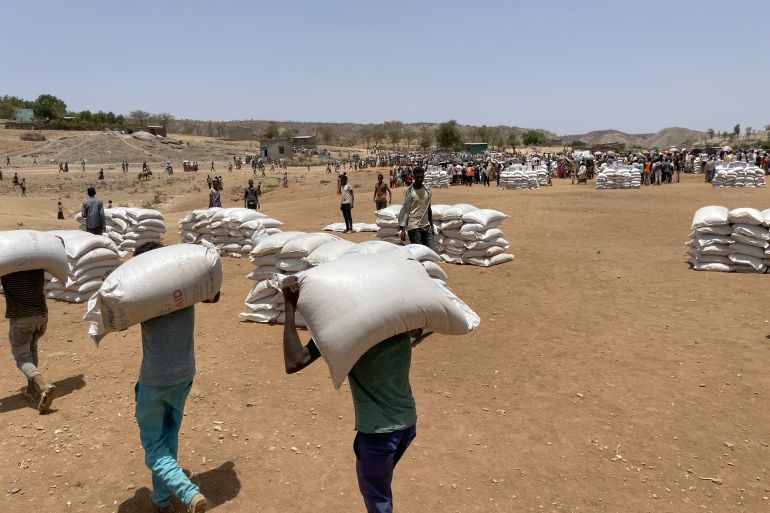Food aid into Ethiopia’s Tigray ‘not matching needs’: UN
Access to some parts of Tigray remains constrained even as all four road corridors are now open, the World Food Programme says.

Aid deliveries into Tigray are “not matching the needs” of the stricken region, the United Nations food agency has said, even as a ceasefire takes hold in war-torn northern Ethiopia.
The World Food Programme (WFP) and its partners “urgently need access to all parts of the region to deliver food and nutrition assistance to 2.3 million vulnerable people,” the WFP said in a statement on Friday.
Keep reading
list of 4 itemsThe legendary flavoured ground salt from India: Pisyu loon
Nearly 55 million face hunger in West and Central Africa, UN warns
Revisiting molokhia amid war and displacement in Gaza
Restoring aid deliveries to Tigray was a key part of an agreement signed on November 2 to end a two-year war that has killed untold numbers of people and unleashed a humanitarian crisis.
The WFP said all four road corridors into Tigray had reopened since the ceasefire and humanitarian flights were flying into main cities, allowing a significant increase in aid supplies to reach the region.
However, it added that “access into some parts of eastern and central zones of Tigray remain constrained – affecting up to 170,000 mothers and children in need of food assistance.”
Aid into the region ground to a halt in late August when fighting resumed between the Ethiopian government and its allies, and fighters loyal to Tigray’s rebellious authorities.
Even before the suspension of aid, the UN had warned many in Tigray already faced starvation, with some 90 percent of its six million people dependent on food assistance.
The region was isolated from the world for more than a year and faced severe shortages of medicines and limited access to electricity, banking and communications.
Since November 15 when road access improved, WFP said nearly 100 trucks had transported 2,400 metric tonnes of food and 100,000 litres (26,417 gallons) of fuel into the region.
Humanitarian flights carrying passengers to Mekele, the regional capital, have resumed for the first time since August, after receiving government approval. Aid charters into Shire, a northern city, also commenced for the first time ever.
“Since the start of November, WFP has reached 29 percent of its caseload of 2.1 million people with food assistance in the Tigray region,” WFP said.
It said an estimated 13.6 million people across Tigray and its neighbouring regions of Amhara and Afar were dependent on humanitarian aid as a result of the war, which broke out in November 2020.
Tigray’s authorities had been resisting central rule for months when Ethiopian Prime Minister Abiy Ahmed accused their leadership of attacking federal army camps and sent troops into the region.
The two parties signed a peace deal in South Africa on November 2 that agreed to unfettered aid into Tigray.